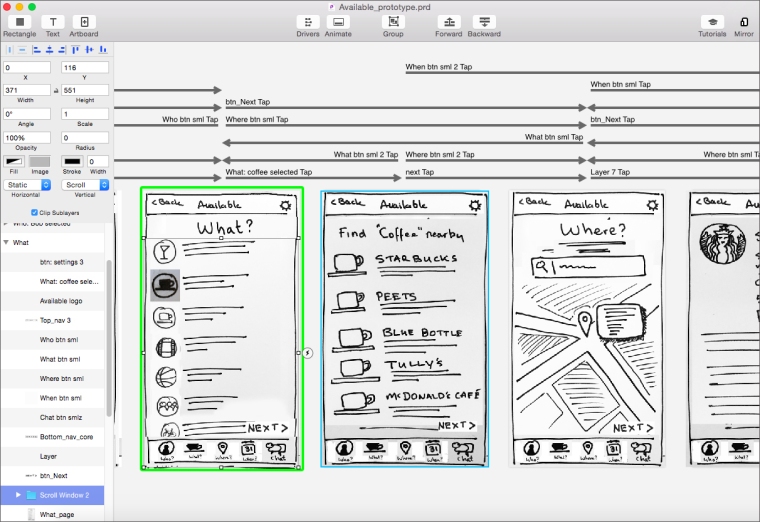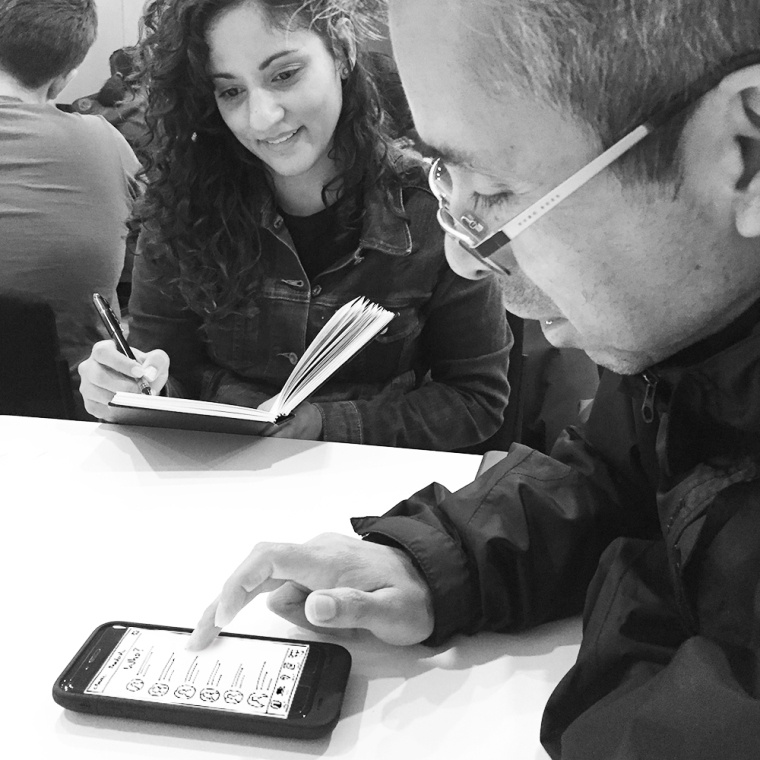
INTRO
Every day more and more start-ups emerge to fulfill unforeseen needs and there aren’t enough designers to meet the demand. Whether they are the size of Google or just 4 people in a loft, chances are you’ll work in one at some point in your design career. With that in mind I’ve written this post on what it’s like to be a designer at a start-up with a leaning towards San Francisco/Silicon Valley.
So what is a start-up?
Usually a start-up is a young company that is creating an app, product or service that is using technology in a new way to solve a previously existing problem. Start-ups begin small and major growth spurts often come through rounds of funding from Venture Capital firms. These VCs hope the start-up will become the next big thing. However for every Airbnb, Facebook or Google there are thousands of small companies just a thumb swipe away, each one trying to ‘make it big’ too.

Working at a start-up vs traditional companies
When compared with older, more established companies, start-ups definitely have a different feel to them. Filled with hope for the future everyone at a start-up is feverishly working away on a product that may be huge one day. However there are 4 major influences on any start-up that create it’s corporate culture:
Firstly, start-ups are living on borrowed time as the money to pay for everything usually comes from Venture Capital investment rather than sales. With their board appointees in the company the VCs demand growth in order to get a return on their investment. Results are key on a quarterly basis and not a lot of time can be wasted on getting things wrong.
Secondly, start-ups attract a lot of Millennials as employees. Young, idealistic and probably lacking a mortgage, spouse or children they can risk having the uncertain future and lack of stability that comes with working at a start-up. This is just as well since Millennials may not thrive well in traditional companies where it could take years to get a senior role there.
More unique to each start-up is the founder’s personality who bring their own unique flavor to the company’s dynamic. They may be super focused and quirky but their vision saw a big enough gap in the market to create a company around. The Founder(s) will have a lot of control over company and product direction and will expect things to happen fast. They are godlike in their domains…
Lastly, each start-up’s industry will heavily define the corporate culture. For example, if you work in a gaming start-up the vibe will be very different from an enterprise data solution start-up. You can guess why and you can also guess which one would be a lot more fun (speaking from experience).

How do you thrive at a startup?
’Start-up environment’ in a job spec used to be a warning that you’ll work very long hours but now it means more than that. Get used to these aspects of a start-up if you want to thrive in one:
Firstly, expect there to be few boundaries and scant or no job descriptions. However the increased expectations of delivering projects often causes equally increased autonomy which in turn inspires individuals to work harder and for longer hours. It’s a trade off: experience and responsibility for effort.
Secondly, get used to change. As the company expands it may physically move office several times. Likewise the whole direction of the company’s product(s) may change as customers use it in unexpected ways. The two factors combined may create a very disorganized start-up. It all comes with the territory: forewarned is forearmed.
Thirdly, accept failure or cancellation of your projects. Start-ups are trying to do something entirely new and no one knows if the market is ready for it. And since time is money (either could run out any time) projects can get cancelled to save both. Don’t worry – you can still put the project in your portfolio in order to get your next job.

What’s the day-to-day work like for a designer?
So how are things different for designers at a start-up compared to traditional companies?
Firstly, you’ll need core design skills such as UX, visual or product design. Ideally all three in the fluid environment of a start-up. This is a good thing for designers since you get to design a wider variety of projects with more responsibility than you would in other roles.
Next is scale. You’ll be working on huge projects that you can’t do on your own such as an app, website or game. As a result you’ll be collaborating with a lot of people who have very different skills to yours such as developers, data analysts, business development etc. Expect to do a lot of group white-boarding sessions with a huge amount of smart thinking. so you’ll be kept on your toes intellectually.
Thirdly expect to do lots of iterations in bursts of activity called ‘agile sprints’ which are pretty much applied to everything in start-ups. This process was originally devised for developers to work in parallel on large projects. As a designers you’ll need to do a lot of prototyping or proof of concept mocks to communicate ideas or pinpoint errors. The ‘fail fast and fail often’ mantra is used at this point to avoid wasting more effort later on. However in reality people don’t want you to fail at all and would rather you are ‘outcome creating’. Be warned.

What will I actually be doing as a designer?
You’ll be working on an entirely new ideas (hopefully) as your start-up tries to create a better, faster or simpler method of doing something. Hopefully the team will be putting the user first with everything you work on. This isn’t rocket science. Users vote with their thumbs in a fraction of a second. Whether you’ve solved the problem well or not will be apparent very fast. With that as your compass here’s what you’ll be doing on a daily basis
With that in mind here are the activities that will fill your days:
– Talking. A LOT of talking. New ideas are what make start-ups thrive
– Meetings with product, marketing, sales and engineering etc.
– Drawing, mostly boxes, on whiteboards
– User research: asking people a lot of questions
– Creating personas of the end user
– Wireframes in Balsamic, Zeplin or similar programs
– Interactive prototypes in Principle, Invision or similar programs
– Detailed files in Sketch, Photoshop or Illustrator

Getting a job at a start-up
The same thinking applies to getting a job at a start-up as it does for any other job. Ideally you’ll demonstrate an interest in the company’s mission e.g. an interest in fitness if you want a job at Fitbit. Look at it from the company’s perspective – they want their start-up populated by enthusiastic people who are living the dream.
You’ll definitely need to have used the product/service before an interview if you can. Even better if you make a case study out of solving an existing problem with the product. Think like the user and think like a business to show you have a ’T’ shaped skill set: flexible enough to be broad but also show you can go deep in one or two core areas. Demonstrate your process with good thinking visualized well and keep any text in a case study to a minimum.
Also try to find someone at the company and get them to add you to the internal system. Most start-ups offer good incentives for employees to find good hires. While you’re at it do your financial research – especially if you would be leaving a full time role to take a job at a start-up. Be aware that you may get offered shares or stock options as part of any financial package. Speaking of which…

What are stock options?
During your job application at a start-up you may get asked if you’ll take stock options as part of your compensation package. So what are they?
Well, they aren’t cash or shares.
Primarily it is the option to buy stock (shares) in the company at a later date. That’s right – they are an option to buy shares: not real money. In order to ‘execute’ your option you will have to pay money to buy the shares from the start-up itself. The hope is that the shares will rise in value when the company goes public.
So why would a company offer stock options? Primarily options allow companies to give some kind of (hopefully) financial benefit without any cost in the short term. However these stock options have to ‘vest’ over time i.e. usually you gain an additional 20% ownership of the stock options for each year you work at the start-up. This is after an initial 1 year ‘cliff’ during which they don’t vest. Eventually you end up with 100% ownership of the options after 5 years.
Before accepting a job offer look at the start-up’s stage of funding i.e. whether it is at series A, B or C of funding. This is key as each round of funding dilutes the value of stock options. In contrast to stock options you may also be awarded RSUs (Restricted Stock Units) which are already paid for stock (shares) in the company.
Click here if you want to know more about the ins and outs of stock options.

Long hours and the commute to work
Before being offered the job at a start-up you need to consider either the commute or the remote working situation. Previously a start-up job might have needed long hours in the office on top of sitting in traffic for a few more hours every day. However with advances in technology it doesn’t have to be that way…
When I first wrote this article (pre Covid) I worked on a team which had people in Montreal, Shanghai, Copenhagen and San Francisco. This process created non traditional hours as a result. I could leave work at 5pm to go to a networking happy hour or go home for dinner with your family. Later on you can do more work from the comfort of your couch.
After Covid, most startups are comfortable with staff being fully remote. Some of the bigger tech companies such as Google and Apple are struggling with where they should draw the line. For me, I now work at Dropbox which got rid of its offices except for collections of meeting rooms called Studios so no more commute for me.
In the San Francisco Bay Area, many of the larger companies were trying to make the trip to office extremely appealing with wifi enabled buses that take their employees from SF to Silicon Valley. At one point Facebook even had a boat to get employees from the city or Marin to their HQ by the water in Menlo Park. Click here to read more about it.
Initially it might seem like you are doing more hours in this kind of ‘always on’ environment, whether in an office or working remotely. However you have the flexibility of setting your own hours or being able to do something during the day such a child’s school event.

CONCLUSION
If you’ve seen the show Silicon Valley you’ll have seen how it parodies the incredible roller coaster ride of success and failure that comes with trying to start a company and launch an entirely new product. Art definitely imitates life in this incredibly well written show.
Your own job at a start-up could be similar: you could be working on the next big thing or it could just as easily crash and burn. It could be both over time as risk is inherent to start-ups.
Either way it’s usually a good experience to have under your belt. After all you’ll probably have fun and do interesting work. For example, one start-up I worked at had huge growth quarter after quarter. I had more responsibility than any previous job and I created a large body of work for my portfolio. I left for another job and by coincidence the company then had two bad quarters in a row. Almost everyone I had worked with was laid off in one day. Such can be the way of start-ups…


